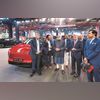Electric vehicles took centre stage at India’s premier auto show, Bharat Mobility Expo 2025, which opened on Friday with as many as 34 vehicles being launched or unveiled, mostly in the EV segment.
Inaugurating the show, hailed as the second-largest auto expo this year, Prime Minister Narendra Modi courted investors, expressing optimism that India’s EV sales could grow eightfold by the decade’s end, creating vast opportunities for both global and domestic manufacturers in the country’s mobility sector.
The event features 34 original equipment manufacturers.
From Maruti Suzuki to JSW MG Motors, Tata Motors to Ashok Leyland, automakers showcased their ambitions to dominate the EV space in their respective segments, signalling intensifying competition. The expo also marked a breakthrough in India’s auto diplomacy, with the government allowing Chinese executives to participate after years of restricted visas.
A large number of them, including senior executives of MG Motor India and BYD India, were among the prominent attendees.
Modi inaugurated the second edition of the Bharat Mobility Global Expo, reiterating his “Make in India, Make for the World” mantra. "India is an excellent destination for investors dreaming of growth in the mobility sector. The government is with you,” he said.
The event is expected to feature over 100 launches spanning automobiles, components, and technologies. Highlighting foreign direct investment in the auto sector, the Prime Minister noted that the industry attracted $36 billion in FDI over the past four years, with expectations of further growth in the near future.
Automobile dispatches from manufacturers to dealers rose by 12 per cent last year compared to 2023, taking total sales to 25.5 million, according to data from the Society of Indian Automobile Manufacturers (SIAM). Modi emphasized this growth and its impact on exports, noting, “Many countries have a population smaller than the number of vehicles sold in India every year. This is why, when it comes to future mobility, India is seen with high expectations.”
He also highlighted a 640-fold increase in EV sales, adding that India now sells in a day what it sold in an entire year in 2014. While only around 2,600 electric vehicles were sold annually 10 years ago, over 1.68 million electric vehicles were sold in 2024, the PM said, adding, this number could increase eightfold by the end of this decade.
JSW MG Motors Director Parth Jindal told reporters that Windsor became India’s largest electric car this month. Meanwhile, Maruti Suzuki's Managing Director and CEO, Hisashi Takeuchi, announced the company’s ambition to become the largest EV manufacturer within a year. Maruti’s first electric car, the e-Vitara, is also set for global export.
Tata Motors, currently leading the electric car segment in India, welcomed increased competition. Shailesh Chandra, head of Tata’s PV and EV divisions, predicted a “tremendous” boom in the EV market, driven by growing consumer confidence due to the presence of all major carmakers.
Maruti Suzuki’s e-Vitara emerged as the main attraction on the first day, while Hyundai Motor launched the Creta at a competitive starting price of Rs 17.99 lakh. Hyundai MD Unsoo Kim stated that the company aims to make India an export hub for emerging markets.
The Prime Minister also underscored the potential of India’s passenger vehicle market, which is currently the world’s third-largest. "In the past, the reason for not buying cars in India was the lack of good-quality roads. But that is changing. Ease of travel is now a priority," Modi said. “In last year's Budget, more than Rs 11 trillion was allotted for infrastructure development.”
In the two-wheeler segment, Suzuki Motorcycle India unveiled three innovative products: The e-ACCESS, Suzuki's first electric scooter; the all-new Access 125; and the GIXXER SF 250 Flex Fuel, India’s first E85-compliant sports bike promoting ethanol-based mobility.
Hero MotoCorp introduced a range of new vehicles and initiatives, entering the 250cc motorcycle segment with the Xtreme 250R and expanding its adventure lineup with the Xpulse 210. In the scooter category, Hero unveiled the Xoom 125 and Xoom 160. The company also showcased its first flex-fuel motorcycle, the ethanol-based Hero HF Deluxe, along with the VIDA V2 e-scooter.
)

)